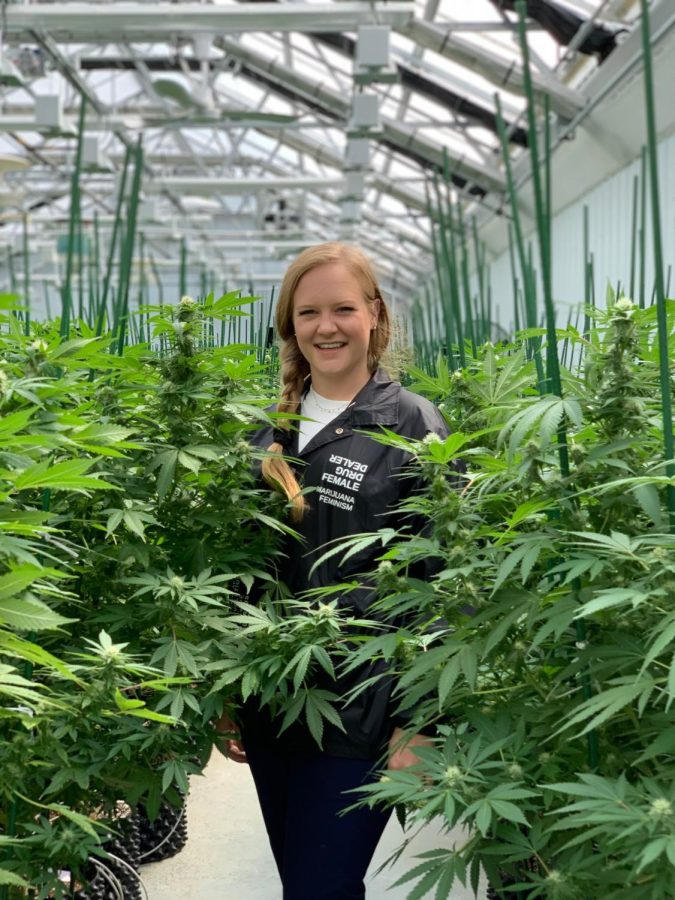Cannabis business; how the marijuana market has changed
Hillary Peckham ’09 serves as the COO at Etain Health, a female -run medical cannabis company. Peckham explained that the medical cannabis industry was greatly impacted by New York’s legalization.
February 22, 2022
When Hillary Peckham ‘09 was in college, her grandmother was diagnosed with ALS, taking 20-25 pills a day as she battled the terminal illness. Her doctor recommended marijuana as a pill-replacement to improve her quality of life, but the Peckham family wasn’t able to find any legal avenues to obtain it. So, when former Governor Andrew Cuomo signed legislation permitting the use of medical cannabis in New York, Peckham’s mother came to her with an idea. A 3000 page business proposal and competitive licensing process later, Etain Health was born.
Etain Health now has four dispensaries across the state, in Yonkers, Kingston, Manhattan and Syracuse. The family business functions as one of the largest medical marijuana companies in New York.
Even though marijuana has become decriminalized and recreationally legalized for adults over the age of 21, marijuana sales are still illegal in New York until licenses are distributed, a process expected to happen by 2023. While it is legal to possess marijuana, there’s no way that the general public can purchase it. Peckham explained that this has led to many loopholes. “So what you see popping up is people who are selling items like posters for $80 and then they’ll gift you cannabis with it. There’s a whole illicit business that’s operating in this gray space because there’s no regulations right now,” Peckham said.
While legalization has posed a competitive challenge to many medical dispensaries, it has slightly relaxed some of the regulations under which medical marijuana facilities have to operate. For example, prior to recreational legalization, dispensaries couldn’t sell the actual flower, but now they can. Peckham described one of the biggest upsides of the regulations shifts for Etain was the relaxed qualifications. “There used to be a list of 10 conditions that qualify for the program. Now whenever you see a doctor, if they think you’ll benefit from medical marijuana, they can prescribe it to you, which puts this much more in line with any other pharmaceutical,” she said.
Peckham noted this as one of the largest challenges medical dispensaries, such as Etain, are facing right now. “It is very challenging to navigate because we still have this sort of restrictive medical market where you have to go see a doctor and then take all these steps to get to our doors and then like there’s literally people who are selling cannabis down the street.”
This “gray area” is due mainly to the current lack of formal legislation to regulate marijuana. The Office of Cannabis Management is in the process of being built, effectively creating a new branch of government to regulate hemp. Peckham described that because cannabis is still illegal on the federal level, New York State has to form this branch from scratch. “They have to hire 200 or 300 employees, train them all, and launch this program. We are expecting a set of regulations which would be ‘Here’s all of the guidelines for how you would operate and sell cannabis in the next three months or so,’ by April 1,” Peckham said. “But I don’t expect anyone to actually get a license for selling adult use or recreational cannabis probably until the beginning of next year at the earliest because it just takes that like so long to set up this whole government agency,” she continued. The lack of government has created a period in which rules are uncertain and policing has become a challenge.
Part of The Office of Cannabis Management’s mission is to “give people impacted by the war on drugs an opportunity to enter the market,” as Peckham put it. The department has proposed a $200 million fund that would go towards licenses for social equity and MWBE (Minority/Women-owned Business Enterprises.)
This fund would aim to balance the marijuana field which is currently dominated by white men, who make up 70% of top executives at the 14 largest cannabis companies, yet were statistically four times less likely to face marijuana related arrests. While the intention is to promote equity, Peckham noted the importance of how the funds are allocated. Because marijuana is federally illegal, there aren’t traditionally banking resources available to business owners. Peckham highlighted that cannabis companies can only be funded privately or through hedge funds on the Canadian stock market. “So that in and of itself creates a lack of diversity because you don’t have funding options,” Peckham explained.
In order to address these issues and push for properly allocated funds, Peckham has worked to promote diverse businesses, such as Etain which is almost entirely woman-run. “Something that Etain has been passionate about is explaining the difficulties of running a cannabis business and what needs to happen to provide long term support to these businesses to make sure that it’s not just diverse on day one, but you’ve created a sustainably diverse industry,” she said




